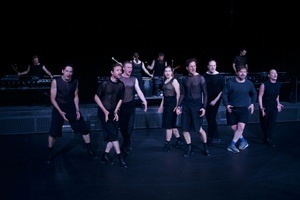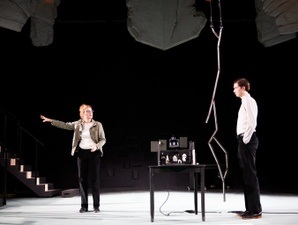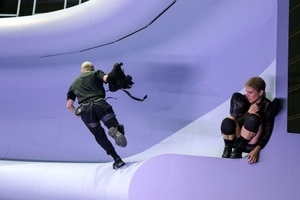Der Gott des Gemetzels
In the organizer's words:
"I don't understand why you have to embarrass yourself like that in front of other people" ... "Hoits Maul"
THE PLAY
Alex and Annette Huber's son has knocked out two of Micha and Veronika Rey's front teeth. So the two couples decide to meet up and come to an amicable agreement. But that is easier said than done. What begins as a conciliatory agreement over clafoutis and espresso escalates into a verbal mud fight in which all the masks of the civilized bourgeoisie fall away. "The God of Carnage" is one of the most frequently performed plays of recent decades and was made into a film under the direction of Roman Polanski.
THE BAVARIAN TRANSLATION
With the Bavarian translation of the play, two theater cultures collide: contemporary spoken theater has a tête à tête with popular theater. The Bavarian dialect has always been used as a stage language within a traditional framework. As the culture of Bavarian is strong and the fear of contact with modern spoken theater is great for various reasons, both cultures exist side by side, with a few exceptions. "Der Gott des Gemetzels" in Bavarian translation is the devious illegitimate child of an offshoot of these two cultures. The conversational comedy remains, but it becomes a French-Bavarian one.
The dialect is so precise and intelligent that the characters never come close to the Lederhosen cliché, but meet somewhere between Paris and Trostberg: Bavaria is Paris and Paris is Bavaria. This is partly reassuring and partly disturbing, but in any case it is a simple but powerful assertion. The usual Bavarian clichés of cozy tradition in lederhosen won't get you very far. And we don't want to, because these clichés are well known. Just clichés.
Like their Parisian twins, the Bavarian characters are at home in the modern world. The narrow, enigmatic and malicious aspects are completely preserved in the Bavarian translation. However, the roughness of the Bavarian language gives the characters an effect that is hard to resist.
With
Sebastian Edtbauer, Cornelia von Fürstenberg, Ina Meling, Matthias Ransberger
Director: Johannes Rieder
Stage: Beni Küng
The production was awarded the Innovation Prize for Folk Culture by the City of Munich.
Translated into Bavarian by Sebastian Edtbauer, based on the translation by Frank Heibert and Hinrich Schmidt-Henkel
This content has been machine translated. Terms and Conditions for lotteries












